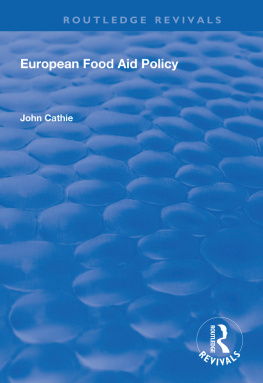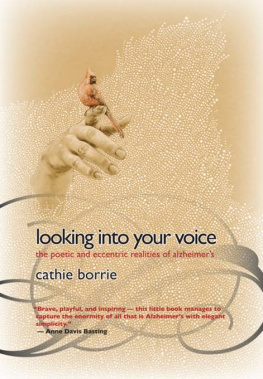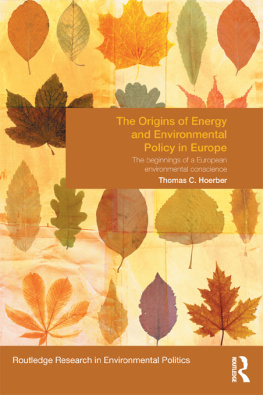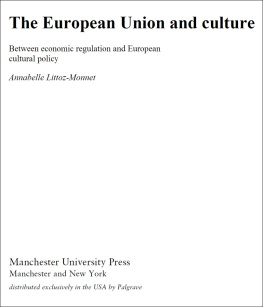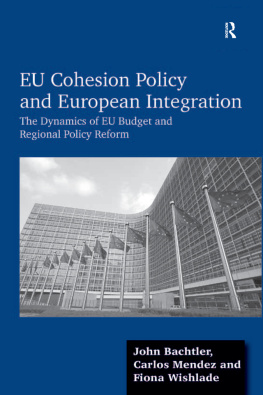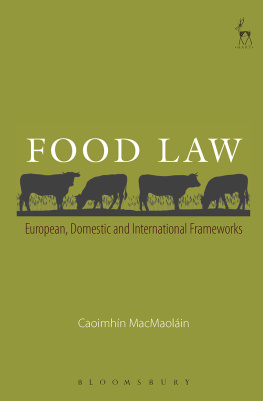John Cathie - European Food Aid Policy
Here you can read online John Cathie - European Food Aid Policy full text of the book (entire story) in english for free. Download pdf and epub, get meaning, cover and reviews about this ebook. year: 1997, publisher: Routledge, genre: Politics. Description of the work, (preface) as well as reviews are available. Best literature library LitArk.com created for fans of good reading and offers a wide selection of genres:
Romance novel
Science fiction
Adventure
Detective
Science
History
Home and family
Prose
Art
Politics
Computer
Non-fiction
Religion
Business
Children
Humor
Choose a favorite category and find really read worthwhile books. Enjoy immersion in the world of imagination, feel the emotions of the characters or learn something new for yourself, make an fascinating discovery.
- Book:European Food Aid Policy
- Author:
- Publisher:Routledge
- Genre:
- Year:1997
- Rating:5 / 5
- Favourites:Add to favourites
- Your mark:
- 100
- 1
- 2
- 3
- 4
- 5
European Food Aid Policy: summary, description and annotation
We offer to read an annotation, description, summary or preface (depends on what the author of the book "European Food Aid Policy" wrote himself). If you haven't found the necessary information about the book — write in the comments, we will try to find it.
European Food Aid Policy — read online for free the complete book (whole text) full work
Below is the text of the book, divided by pages. System saving the place of the last page read, allows you to conveniently read the book "European Food Aid Policy" online for free, without having to search again every time where you left off. Put a bookmark, and you can go to the page where you finished reading at any time.
Font size:
Interval:
Bookmark:
Agricultural Economics Unit/Department of Land Economy University of Cambridge

2 Park Square, Milton Park, Abingdon, Oxon, OX14 4RN
711 Third Avenue, New York, NY 10017, USA
Product or corporate names may be trademarks or registered trademarks, and are used only for identification and explanation without intent to infringe.
The publisher has gone to great lengths to ensure the quality of this reprint but points out that some imperfections in the original copies may be apparent.
The publisher has made every effort to trace copyright holders and welcomes correspondence from those they have been unable to contact.
- Chapter One:
The background to and the establishment of the European food aid programme - Chapter Two:
The development of a European food aid policy since 1968 - Chapter Three:
Agricultural trade policy, European food aid and surplus disposal - Chapter Four:
The formulation and management of European Union food aid policies and programmes 1968-1994 - Chapter Five:
Multilateral food aid policy, non-governmental aid organisations and the food aid policy of the European Union - Chapter Six:
Recipients of European food aid and its effectiveness as a development resource
- Chapter One:
The background to and the establishment of the European food aid programme - Chapter Two:
The development of a European food aid policy since 1968 - Chapter Three:
Agricultural trade policy, European food aid and surplus disposal - Chapter Four:
The formulation and management of European Union food aid policies and programmes 1968-1994 - Chapter Five:
Multilateral food aid policy, non-governmental aid organisations and the food aid policy of the European Union - Chapter Six:
Recipients of European food aid and its effectiveness as a development resource
- ACP African, Caribbean and Pacific group of seventy countries, signatories of the EU Lome Convention
- ADB Africa Development Bank
- ASI International Solidarity Association, French acronym for NGO
- CAP Common Agricultural Policy of the EU
- CCC Commodity Credit Corporation of the US Department of Agriculture
- CCP Committee in Commodity Problems (FAO)
- CEEC Central and Eastern European Countries
- CSD Committee on Surplus Disposal (FAO)
- CUP Customs Union Policy of the EU
- DAC Development Assistance Committee (OECD)
- DG Directorate Genera! of the European Union
- ECHO European Community Humanitarian Office
- ECU European Currency Unit
- EDF European Development Fund
- EFTA European Free Trade Area
- EU/EC/EEC European Union (also known prior to the Maastricht Treaty as EC, Economic Community, EEC, European Economic Community)
- ERP European Recovery Programme (Marshall Plan)
- FAC Food Aid Convention (of the International Wheat Agreements)
- FAO Food and Agricultural Organisation of United Nations
- FFHC Freedom from Hunger Campaign of the FAO
- FSR Former Soviet Republics
- GATT General Agreement on Tariffs and Trade (now known as the WTO)
- GIEWS Global Information and Early Warning System of FAO
- GSP Generalised System of Preferences
- IBRD International Bank for Reconstruction and Development (World Bank)
- ICRC International Committee of the Red Cross
- IFAD International Fund for Agricultural Development
- IEFR International Emergency Food Reserve of the WFP
- IMF International Monetary Fund
- INTERFAIS International Food Aid Information System of WFP
- IWA International Wheat Agreement(s)
- IWC International Wheat Council
- LRCS League of Red Cross (Red Crescent) Societies
- NDDB National Dairy Development Board (Operation Flood India)
- MSF Medecins sans Frontieres (French NGO)
- NGO Non-governmental Organisations (also known as NGDO, non-governmental development organisations and NGAOs non-governmental aid organisations)
- NOHA Network on Humanitarian Assistance
- ODA Official Development Assistance
- ODA Overseas Development Administration of the UK
- OECD Organisation for Economic Co-operation and Development
- OJ Official Journal of the EU
- PL 480 Public Law 480, United States Food Aid Programme
- SADCC Southern African Development Co-ordination Conference
- SADC Southern African Development Community (successor to SADCC)
- SMP Skimmed milk powder
- UMRs Usual Marketing Requirements
- UNCTAD The United Nations Conference on Trade and Development
- UNHCR United Nations High Commission for Refugees
- UNRWA United National Relief and Works Agency (Palestine Refugees)
- USDA United States Department of Agriculture
- USAID United States Agency for International Development
- WB World Bank
- WFC World Food Council
- WFC World Food Conference (1974)
- WFP World Food Programme of the United Nations
- WTO World Trade Organisation (successor to GATT)
Font size:
Interval:
Bookmark:
Similar books «European Food Aid Policy»
Look at similar books to European Food Aid Policy. We have selected literature similar in name and meaning in the hope of providing readers with more options to find new, interesting, not yet read works.
Discussion, reviews of the book European Food Aid Policy and just readers' own opinions. Leave your comments, write what you think about the work, its meaning or the main characters. Specify what exactly you liked and what you didn't like, and why you think so.

